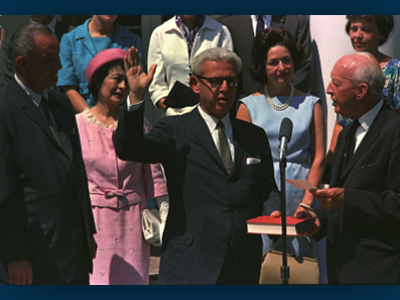January 19, 1990
Arthur Goldberg, former U.S. Supreme Court Justice, labor secretary and ambassador to the United Nations, dies at age 81 at home in Washington.
Born in Chicago in 1908, Goldberg became a lawyer in 1930 and practiced law in Chicago, focusing on labor law. In 1948 he became the general counsel for the United Steelworkers of America and played a prominent role in the 1955 merger of the American Federation of Labor and the Congress of Industrial Organizations.
President John Kennedy named him labor secretary in 1961 and appointed him to the Supreme Court in September 1962 after the retirement of Felix Frankfurter. In 1965, President Lyndon Johnson asked Goldberg to become the U.S. ambassador to the United Nations. After initial hesitation, Goldberg accepted the position because he was hopeful that he could help bring about an end to the Vietnam War.
Although he was unable to accomplish his primary goal at the United Nations and would resign in frustration in April 1968, Goldberg played a prominent role as one the chief authors of and primary negotiator for U.N. Security Council Resolution 242 in 1967. For nearly five months, the exact text of the resolution was carefully debated in the Security Council and General Assembly. Finally, Lord Caradon of Great Britain evolved the final draft in November 1967. Goldberg played a primary role in its adoption.
The resolution became the context and framework for subsequent Arab-Israeli negotiations. The central concept in the resolution was an exchange of land Israel won in the 1967 war — some or all of the Sinai Peninsula, the Golan Heights, portions of Jerusalem, the West Bank and the Gaza Strip — for peace and recognition by Arab neighbors and states. While the resolution prescribed the notion of “land for peace,” it was worded to serve as a basis for negotiations and did not specify which lands.
According to Goldberg in a 1988 article, “What Resolution 242 Really Said,” “The resolution does not explicitly require that Israel withdraw to the lines that it occupied on June 5, 1967, before the outbreak of the war. The Arab states urged such language; the Soviet Union proposed such a resolution to the Security Council in June 1967, and Yugoslavia and other nations made a similar proposal to the special session of the General Assembly that followed the adjournment of the Security Council. But those views were rejected. Instead, Resolution 242 endorses the principle of the ‘withdrawal of Israeli armed forces from territories occupied in the recent conflict’ and juxtaposes the principle that every state in the area is entitled to live in peace within ‘secure and recognized boundaries.’” (Goldberg, Arthur, “What Resolution 242 Really Said,” in American Foreign Policy Interests, Jan/Feb 2011, Vol. 33 Issue , p.44)









